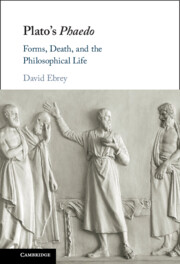Book contents
- Plato’s Phaedo
- Plato’s Phaedo
- Copyright page
- Dedication
- Contents
- Acknowledgments
- Introduction
- 1 The Characters
- 2 The Phaedo as an Alternative to Tragedy and Socrates as a Poet
- 3 Defense of the Desire to Be Dead
- 4 Cebes’ Challenge and the Cyclical Argument
- 5 The Recollecting Argument
- 6 The Kinship Argument
- 7 The Return to the Defense
- 8 Misology and the Soul as a harmonia
- 9 Socrates’ Autobiography
- 10 Cebes’ Objection and the Final Argument
- 11 The Cosmos and the Afterlife
- 12 The Death Scene
- Bibliography
- Index Locorum
- Index
9 - Socrates’ Autobiography
95e–102a
Published online by Cambridge University Press: 02 February 2023
- Plato’s Phaedo
- Plato’s Phaedo
- Copyright page
- Dedication
- Contents
- Acknowledgments
- Introduction
- 1 The Characters
- 2 The Phaedo as an Alternative to Tragedy and Socrates as a Poet
- 3 Defense of the Desire to Be Dead
- 4 Cebes’ Challenge and the Cyclical Argument
- 5 The Recollecting Argument
- 6 The Kinship Argument
- 7 The Return to the Defense
- 8 Misology and the Soul as a harmonia
- 9 Socrates’ Autobiography
- 10 Cebes’ Objection and the Final Argument
- 11 The Cosmos and the Afterlife
- 12 The Death Scene
- Bibliography
- Index Locorum
- Index
Summary
This chapter begins by arguing that to understand Socrates’ (alleged) autobiography, we need to appreciate that he distinguishes between the terms “aitios” (responsible) and “aitia” (cause). Socrates’ account should be understood against the backdrop of the sophisticated treatments of aitios and aitia and of hypotheses in fifth-century medical treatises. At the same time, the autobiography shows how Socrates – as portrayed throughout Plato’s dialogues – would engage with the natural scientific tradition: he shows his hallmark profession of ignorance; he becomes excited by the prospect of acquiring knowledge of the good; since he is unable to learn this from Anaxagoras or others, he proceeds in a way that does not require knowledge; instead, he hypothesizes the existence of the things sought by his typical “what is it?” question. I argue that Socrates might not be interested in teleology here, as opposed to simply being interested in knowledge of the good. Once we situate the method of hypothesis within the overall dialogue, we can see that it is supposed to help one slowly build rational trust in a theory, thereby avoiding the cycle of trust and doubt that leads to misology.
Keywords
- Type
- Chapter
- Information
- Plato's PhaedoForms, Death, and the Philosophical Life, pp. 207 - 247Publisher: Cambridge University PressPrint publication year: 2023

